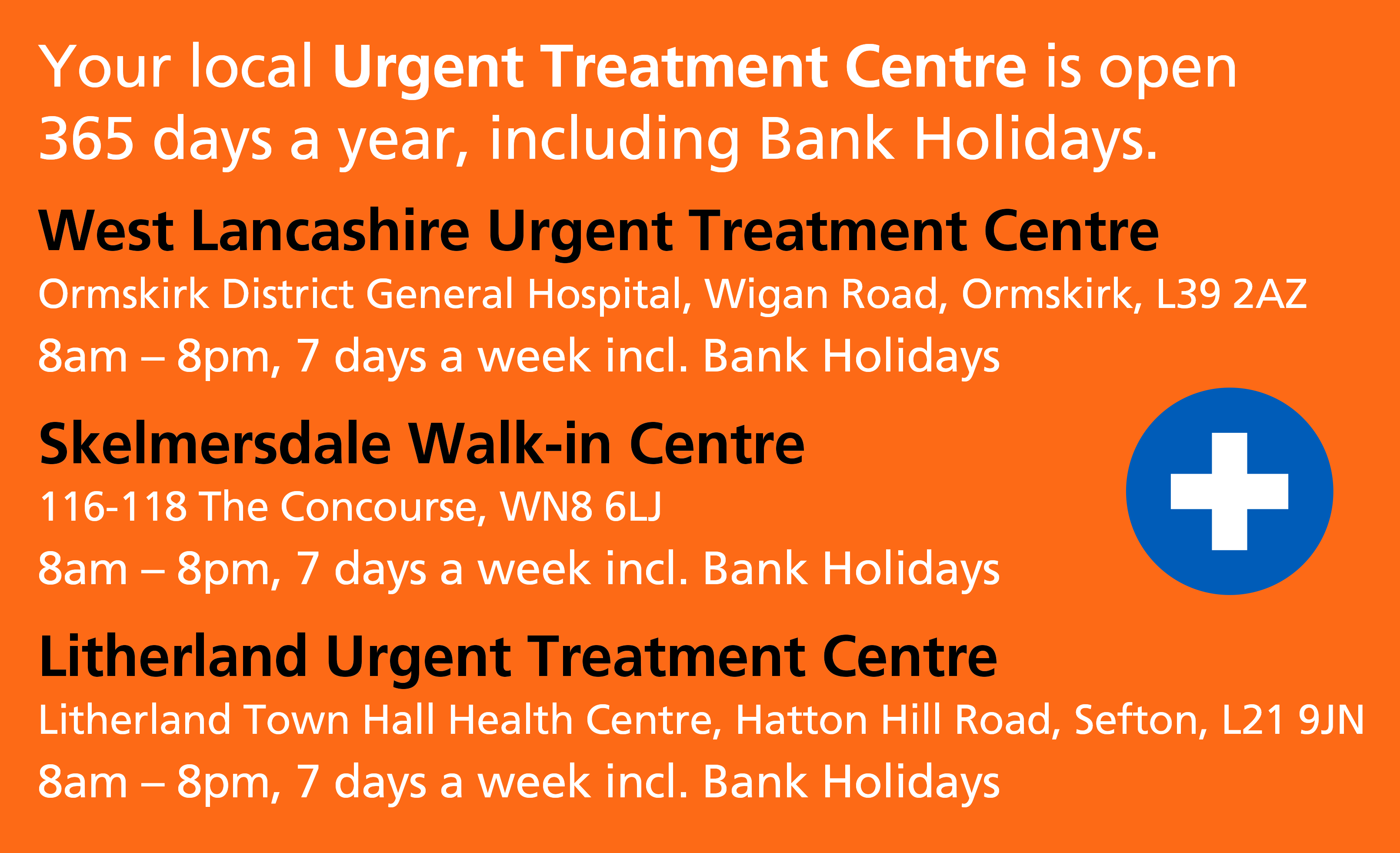
Make sure you are getting the Right Care in the Right Place
%20(1)%20Cropped%20EXTRA.png)

You could be getting treated here:
- NHS111
NHS 111
Residents in St Helens, Knowsley, Halton, Southport, Formby and West Lancashire who are in need of urgent – but not emergency care – are being asked to contact NHS 111 first, before travelling to hospital.
Use the online service: www.111.nhs.uk or freephone 111
Trained advisors are available 24/7 for urgent medical help or advice.
They can also arrange appointments for you to see the right health care professional in the right place.
111.nhs.uk can help you with:
- where to get help for your symptoms, if you’re not sure what to do
- how to find general health information and advice
- where to get an emergency supply of your prescribed medicine
- how to get a repeat prescription
- get emergency dental appointments
You should still ring 999 if you experience:
- signs of a heart attack like pain like a heavy weight in the centre of your chest
- signs of stroke such as your face dropping on one side
- difficulty breathing
- heavy bleeding that won’t stop
- seizures
- or sudden and rapid swelling of the eyes, lips, throat or tongue

- Talk to your Pharmacist and ordering repeat prescriptions
Talk to your Pharmacist
Search online for 'find a pharmacy' or scan the QR code below
Going to your local pharmacy offers an easy and convenient way to get clinical advice on minor health concerns - you don't need an appointment and you can be seen in a private consultation room.
Your local pharmacist can now supply medicines for seven conditions, if appropriate, without the need for a GP appointment or prescription.
These conditions include earache (for those aged between 1 and 17), impetigo, infected insect bites, shingles, sinusitis, sore throat and urinary tract infections (UTIs) for women aged 16-64 years.
They are also trained to tell you when your symptoms mean you need to see a doctor.
With early morning and late night opening times, 365 days a year, there will always be a pharmacy open near you.

Repeat Prescription Ordering
Patients in Cheshire and Merseyside can save time by ordering regular medication using the NHS App.
The NHS App is the quickest and easiest way to order a repeat prescription – and it puts you in better control of your own health.
You can use the App to order your medication at a time that’s convenient for you, and select which pharmacy you would like your medication to be sent to each time you order.
The NHS App also allows you to access a range of other NHS services - you can use it to view your GP health record, find your NHS number, register your donor status, check your vaccinations, and more.
By ordering repeat prescriptions yourself through the NHS App, you’ll also help the NHS to reduce unnecessary medicine waste and save money, as you can just order what you need, when you need it.
The NHS App can be downloaded straight to your mobile phone or another device via the Apple App Store or Google Play, or if you would rather use a PC, you can also set up an NHS account and log in via the website: www.nhs.uk/nhs-app/account/.
For for more help getting started, you can also use the ‘Help’ button in the app, or visit: nhs.uk/helpmeapp
The NHS App lets you order your repeat prescriptions yourself – meaning you can just order the medications you need, whenever you are running low, and you can choose to send them to any pharmacy of your choice.
But don’t forget that when you’re ordering medication online, you will need to plan ahead – just as you do with paper-based prescriptions. It’s best to order your repeat prescription seven days in advance. Don’t wait until you’re just about to run out, as it can take time for your request to be approved by your GP practice and dispensed by the pharmacy - especially when they’re very busy.
- Your GP
If you are feeling unwell with a non-urgent health concern, contact your GP practice.
All local GP practices are open and face-to-face appointments are available for those who need them. Evening and weekend appointments are also available across all areas.
Contact your local GP practice directly online or by telephone.
- Your Local Urgent Treatment / Walk-in Centres

- Accident and Emergency (A&E)
Accident and Emergency (A&E) Departments are for serious and life threatening illness and injuries.
On arrival, you will be booked into ED, your care will be prioritised based on the outcome of your initial assessment.
All patients that come to our ED will be seen and assessed, and a decision made about which area of the department best suits your treatment needs.
Patients aren't always seen in order of their arrival at the Emergency Department. Other people may take priority to you, and therefore you may have to wait to be seen.

Further Support and Advice
- Children's Symptom Checker - Is my child too ill for school?
Alder Hey Symptom Checker
Alder Hey Children’s Hospital has developed an online symptom checker to help parents and carers understand their poorly child’s symptoms and what they can do for them.
Using the Symptom Checker will help you decide where best to get the right care for your child. Get started at: www.alderhey.nhs.uk/conditions/symptoms-checker
Is my child too ill for school?
It can be tricky deciding whether or not to keep your child off school, nursery or playgroup when they're unwell.
Visit the 'Is my child too ill for school?' page on the NHS website.
- Mental Health and Wellbeing
If your mental or emotional state quickly gets worse or deteriorates, this can be called a ‘mental health crisis’. In this situation, it is important to get help quickly.
If you need help, 24 hours a day, 7 days a week support is available for children, young people and adults.
If you live in St Helens, Halton, Knowsley or Warrington:
If you need help:
24/7 support is available for children, young people and adults in St Helens, Halton, Knowsley and Warrington.
For direct support from a trained professional, text SHOUT to 85258 or call the Mental Health Crisis Team freephone: 0800 051 1508.
If you live in Liverpool or Sefton:
If you feel you are in crisis:
Mersey Care provide telephone support for people aged 16 and over experiencing a mental health crisis via the freephone number below.
For urgent mental health support, 24 hours a day, 7 days a week Freephone: 0800 145 6570
If you live in Lancashire or South Cumbria:
If you are in need of wellbeing and mental health support but don’t feel you are in crisis contact:
Lancashire and South Cumbria NHS Foundation Trust (LSCFT) Wellbeing and Mental Health Line
Monday to Friday 7.00pm until 11.00pm. Saturday to Sunday 12.00pm until Midnight.
Freephone: 0800 915 4640
If you feel you are in crisis:
Lancashire and South Cumbria NHS Foundation Trust (LSCFT) Mental Health Crisis Line
24 hours a day, 7 days a week. If you need urgent help as you are in mental health distress, then there is always someone you can call.
The Mental Health Crisis line is staffed by trained mental health professionals who are able to provide assessment and referrals to appropriate services – ring it if you need to access services or for advice about someone who needs treatment/support.
Freephone: 0800 953 0110
Hospital Mental Health Liaison Teams
These teams offer a 24 hour service based at the A&E departments in:
The teams provide support for people who are identified in A&E departments as having a mental health issue, as well as physical health problems.
- Looking after yourself - self care
During the year, you need to keep yourself well during and self treat minor illnesses (eg. cold/ sore throat), therefore freeing GP and hospital appointments for those who need them most.
Help to stay well by following the top tips on this page to look after yourself and your family.
You matter! Please don’t ever stop taking care of yourself.
It can be hard, especially if you’re feeling unwell or anxious. But little things, a bit of time out, a pampering session or even just a walk, really do give you the feel good factor.
- Remember to order your repeat prescriptions well in advance so that you don’t run out!
- Speak to your pharmacist about what to keep in your medicine cabinet or search online for NHS medicine cabinet
- A basic first aid kit is essential, you can buy one in most pharmacies or supermarkets.
Home Medicine Cabinet
We suggest you keep the following:
- Paracetamol and aspirin (children under 16 and people with asthma should not take aspirin)
- Mild laxatives
- Anti-diarrhoeal medicines
- Rehydration mixture
- Indigestion remedy (for example, antacids)
- Travel sickness tablets
- Sunscreen – SPF15 or higher
- Sunburn treatment (for example, calamine)
- Tweezers and sharp scissors
- A thermometer
- A selection of plasters, non-absorbent cotton wool, elastic bandages and dressings
Remember:
- Keep the medicine chest in a secure, locked place out of reach of small children
- Always read the instructions and use the suggested dose
- Watch expiry dates – don’t keep or use medicines past their sell-by date
- Take all unwanted and out-of-date medicines back to the pharmacy
Taking good care of yourself
Research has shown that there are five factors to feeling and staying well:
1 - Connect with other people
Feeling close to, and valued by, other people is a fundamental human need and makes you function better. Talking really does help. Try taking five minutes to get in touch with someone. Talking instead of texting or emailing ask how they are and really listen when they tell you. If you’re out talk to someone new.
2 - Be active

Can a walk to the shops or mowing the lawn really be that good for you? The researchers say yes, the chemicals it releases called endorphins actually make you feel better and more positive. If you meet someone while you’re out even better.
You can do it at work too, walk to someone’s desk instead of calling or emailing. It’s simple but it works.
3 - Take notice
We all get bogged down in our own thoughts and feelings. Stop and take notice of what’s around you, enjoy the moment – the researchers say being aware of what’s around you this can make you think more about what’s really important in your life – and make decisions based on what you want from life
4 - Learn
It’s often said you’re never too old to learn – and the research says it’s true!
Starting a course when you’ve not studied for years isn’t easy – but the confidence and satisfaction is worth it and you’ll meet new people. Study something you think you’ll enjoy. It’ll help you to set goals and look forward which will help as part of your recovery plan.
5 - Give
It’s official - people who give to others rate themselves as happy. Become a volunteer, maybe at a charity shop, through your local Council for Voluntary services or with Mersey West Lancashire Teaching Hospitals NHS Trust:
More stuff to help you feel better and stay that way….
MIND tips for staying well
Big White Wall
CALM: Campaign Against Living Miserably
Family Lives: support and advice
Mental Health Foundation
Mind
Rethink Mental Illness
Samaritans
Turning Point
Young Minds - Emergency Dental Treatment
If you need dental treatment in an emergency
- call a dentist: some surgeries offer urgent appointments at short notice
- if you do not have a dentist, find one by calling NHS 111
If you need to see a dentist out of hours
- call a dentist: their voicemail may advise where to get out-of-hours treatment
- call NHS 111 to find an out-of-hours dental service near you
Do not contact a GP, as they will not be able to offer emergency or out-of-hours dental care.
If you're in pain while waiting to see a dentist, take painkillers such as paracetamol or ibuprofen. NHS 111 can also offer other self-care advice.
Do you need urgent dental treatment?
Local dental providers offer NHS Urgent Dental Clinics with urgent appointments for patients who need urgent treatment, advise and support on dental queries or referral to other services.
If you need help with an urgent dental problem, call one of the helplines below, available from 9am to 9:30pm every day, including weekends and Bank Holidays.
Please note: this is an appointment only service - we do not operate a 'drop-in' service at any of our surgeries.
Dental Helplines
- In West Lancashire, call 0300 1234 010
- In Cheshire and Merseyside call 0161 476 9651
- Loneliness
Beat loneliness
Feeling lonely isn't in itself a mental health problem, but the two are strongly linked. Having a mental health problem increases your chance of feeling lonely, and feeling lonely can have a negative impact on your mental health.
To help people cope with loneliness Mersey Care have produced a short animation, with handy tips and advice on how to maintain good mental health and wellbeing.
- Norovirus (vomiting bug)
Norovirus is a stomach bug that causes vomiting and diarrhoea. It can be very unpleasant, but usually goes away in about two days.
Check if you have norovirus on the NHS website.
The main symptoms of norovirus are:
- feeling sick (nausea)
- diarrhoea
- being sick (vomiting)
You may also have:
- a high temperature of 38c or above
- a headache
- aching arms and legs
The symptoms start suddenly within 1 to 2 days of being infected.
- Sepsis
Trust Sepsis leaflets:
Title - Paediatric Sepsis Care
Description - This leaflet has been produced to provide more understanding to patients, their parents and/or carers affected by sepsis.
Title - Sepsis Explained
Description - Sepsis occurs when the body’s natural reaction to an infection is so strong that it damages parts of the body.
Title - Sepsis Patient Care Leaflet
Description - This leaflet has been produced to provide more understanding to patients and carers affected by sepsis.
Website Links
- Cost of living support and information
In the UK, we’re experiencing a cost of living crisis – costs of things like energy bills or your weekly shop are rising faster than our wages. This means more people might be experiencing financial difficulties, and we know that money worries can have a significant impact on our mental health and wellbeing.
Below you will find links to your local borough council with information on support and services that are available to help you:

